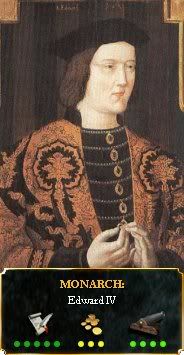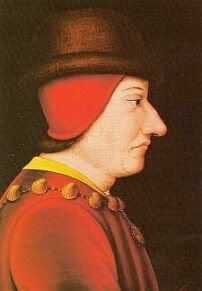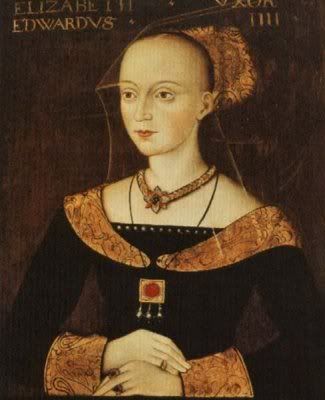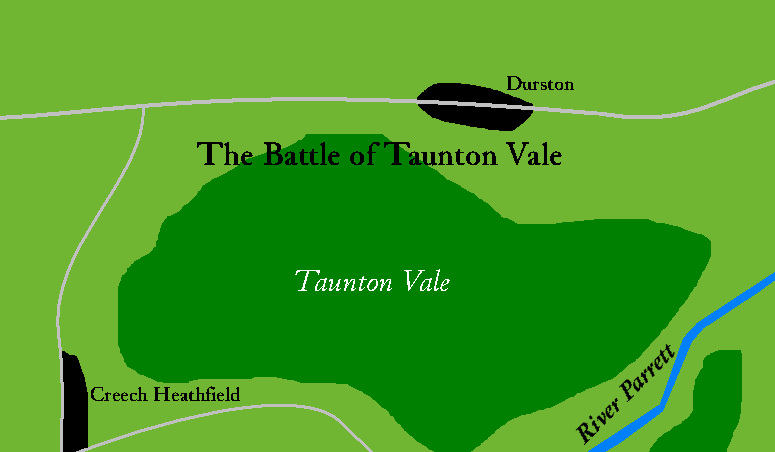JimboIX: Yeah, he would have been Edward the whatever else if it weren't for that. Later kings will have different numbers because of that.
thrashing mad: I should hope you can catch up quickly, I post at a ridiculously slow rate anymore.
 Olaus Petrus:
Olaus Petrus: Well, similar conditions existed at almost exactly the same time, so why wouldn't the leading Scottish nobles comission the letter?
- - - - - - - -
Edward IV
Born: 28 April 1442, Ghent
Married: Elisabeth Woodville (on 1 May 1464)
Died: 9 April 1483, Reading
Titles: (claimed but unrecognised in brackets)
King of England, Wales, Scotland, Ireland [and France]
Lord of the Scottish [and Greek] Isles
Duke of Holland and Westfriesland, Cornwall, [Iceland and Bretagne]
Count of Guines
Bheir duine beath' air eiginn, ach cha toir e rath air eiginn.
A man can force success, but not fortune.
--Scottish proverb
Edward was not born to take the English throne, being the son instead of the Duke of Cornwall, Robert (albeit the eldest surviving son). The family had never had a particularly strong claim to the throne, and as long as things went at least reasonably the descendants of Adam de Cornouaille were only too happy to support the elder line of King William's descent. Said elder line soon fell into disorder, however, as all but Maelgwn went through long and painful regencies. It was this that gave the Cornwallists their excuse to take the throne: The Privy Council basically dissolved, so that neither Maelgwn nor Ioan were officially declared king.
"This sun of York", as Shakespeare so famously termed him, was by far the tallest of his family. Nearly six and a half feet (195 cm) tall, he was an extremely imposing figure, especially for the time. This could be combined with his famous bravery during the Wars of the Roses to make his soldiers ready to fight for him no matter what the situation. The death of his father at the Battle of Monmouth made him the head of his family, and he used this perfectly to gain the throne within months.
Edward, almost as soon as he had taken the throne, quickly found his tattered country at war yet again. A new king had risen to the throne of France: Louis XI, son of the King Charles who had driven the English out of that country. Known as "the Spider", he was an infamous plotter who had made his father's late reign rather unstable (preventing him from gaining Upper Lorraine, which had been the reason behind the Palatine War of 1454). Louis was the center of a grand alliance including himself, England (although he was no lover of the Cornwallists, something which would become important a few years later), and Poland.
Louis XI of France, the "Spider King".
The war again involved French meddling in Germany, this time gaining the undesirable attention of the Holy Roman Emperor, Dietrich of Lorraine.* Dietrich also had an alliance behind him: Lithuania, Baden, Bohemia, and Strassburg, all very worthy opponents. At first Edward hoped to ignore it, but Lorraine was unfortunately on the border with Holland, and the war soon spilled over there. In January 1463 the army of the Duke of Baden attacked Brabant and Zeeland, besieging the prosperous port city of Antwerp. Such a challenge to the English economy could not be allowed to stand, and Edward led an army across the Channel, reaching Calais in February.
Before he could begin marching to the Netherlands, however, the Welsh branch of the family reappeared. Ioan II and his wife Margaret were still alive, well, and out of Edward's custody, and they still had designs on the throne. Once again, as it had been in 1455, the Cornwallist army was on the Continent while enemy ships prowled the seas in between them and their own island. This time, they could not rely on France for help: The Spider was in fact secretly rooting on the Welsh branch. Instead, the English would themselves have to push out of the way the Lithuanian navy in the Channel.
This they did in a battle every bit as spectacular as that near Calais eight years earlier, and Edward marched back across Kent. The army of Baden retreated to defend themselves against France, the Lithuanians gave the English £13,000 to leave their ships alone, and the Wars of the Roses were back on. The two armies met at Birmingham--then little more than a small market town--on 23 September 1463. It was an embarassing defeat for Edward, as despite having slightly superior numbers he left a flank open and barely escaped with an intact army. Ioan did not have the throne, but the Welsh branch was resurgent, and a second army appeared in Surrey, threatening London directly.
A lesser man would have quite reasonably panicked, but Edward was still in control of the situation. He was calm enough that at this time he began his famous affair with Elisabeth Woodville, an event which would have major ramifications later. In any case, he was soon back on the battlefield, and on 17 February 1464 smashed the southern army at Bromley, just south of London. By this point, Ioan had taken several castles in the Midlands and threatened to inflame the entire North. Edward simply marched north, destroyed the army, and began to retake the castles. However, he was unable to capture Ioan and Margaret, who fled to Wales.
The highlands of that country are formidible, and the people, especially the infuential Glyndwr** family of Powys, supported Ioan in large numbers. Edward made a half-hearted expedition in November of 1464, but with winter coming on he could do little to deal with Ioan this time around and was forced to retreat back to Shrewsbury by the end of the month. Once March 1465 came around, Edward returned, with overwhelming numbers.
Although the two armies had been approximately equal in November, the winter had been as harsh to Ioan as it had been to Edward. Of his original 12,000 men, only around 5,000 remained with him. Part of this can be attributed to the deprivations of winter, but political concerns came into play as well. While the major lords--the Duncelds of Gwent, the Gwasdewis of Gwynedd, and the aforementioned Glyndwrs--were entirely behind Ioan, many of the lesser lords realized that they could not hold out against Cornwall forever. Once Edward realized that he could not allow such a festering sore to remain, he would come with 25,000 or more and smash the Welsh through sheer numbers. So, nearly half of the army simply dissipated, leaving Ioan and his lords to face nearly four-to-one odds in March.
The battle was met near the castle of Dryslwyn in Carmarthenshire, and could be described as nothing less than a rout. Edward simply overwhelmed his enemy and gained a massive boon: Both Ioan and Margaret were with the army, and the former was lost by the Welsh during the chaos of the fight. With Ioan in Edward's hands, the remaining lords attempted to reconcile themselves with Edward. Here the new king nearly made a fatal mistake: at first, he refused to have any dealings with them, putting any latent supporters of Ioan on full alert. Another uprising appeared in the Salisbury region, and Edward appeared as if he would face the full brunt of half of England suddenly rebelling.
By necessity he quickly changed his stance. The Welsh lords were pardoned, the Salisbury revolt was crushed, and many of the latent Welshists became Cornwallists instead. But the closest man to Edward was one who had been a staunch supporter of the Cornwallist cause from the beginning: Sir William Hastings.
A Yorkshire lord, Hastings was both a good soldier and an intelligent administrator. Edward knew of his loyalty and ability, knighting him on the field at Colston, appointing him Lord Chamberlain, and making him reciever-general of the king's own home duchy of Cornwall in May of 1461. By 1465 he had gained much of the Midlands, replacing the many lords who had supported Ioan. Hastings became a prototype of the later Prime Minister, running whatever Edward didn't have time or ability to run. His decisions were generally good, and certainly played a role in ending the instability for the next several years.
But instability was inevitable. First, there were many supporters of Ioan, and with Margaret still alive and in France, they had someone to rally around if the moment came. Secondly, Edward had married Elisabeth Woodville, more out of his own lust--and such is well known to have existed in large amounts, both with her and with others--than any practical concern. Elisabeth had refused to have anything to do with Edward unless he married her, and the king knew that such would be necessary. The two were secretly marred on 1 May 1464, and the secret was soon out.
Elisabeth Woodville.
The problem was twofold: First, as a contemporary Burgundian noted, "she was not his match, however good and however fair she might be." Elisabeth was of too base a family--barely in the nobility at all--to be a proper queen. Second, the marriage was at cross purposes to that of Warwick. He had hoped for a marriage into the families of France or Lorraine to help end troubles on the Continent, and the news of Edward's marriage ruined this. Edward knew this quite well, and it is possible that he agreed to the marriage to prevent Warwick from gaining more influence.
Whatever the reason, Warwick became an opponent of the king. His first attempt was to force his influence over Edward, much as Robert of Cornwall had attempted to gain control of Ioan II back in 1455. The feud broke into open rebellion on 27 October 1469, when Warwick officially announced that Edward was unfit to rule by himself. An army appeared in Cornwall, and the remaining supporters of the Welsh cause soon inflated it. When it became obvious that Edward could not be dominated, Warwick gave in to his new soldiers. After an initial victory in the later part of the year, he threw in his lot with Ioan and prepared to put him on the throne.
The time had come for a decisive battle in the Wars of the Roses. Edward led nearly 20,000 men into Cornwall to face a slightly larger army under Warwick. The campaign began as one of maneuver, but Warwick pulled off an intelligence coup, convincing Edward that 8,000 of his men were encamped near the village of Durston, a few kilometers northeast of Taunton. The truth was that, in fact, Warwick had 20,500 men there, and Edward only brought 9,000 (the rest scattered about looking for the rest of Warwick's army).
The centerpiece of the battle was a forested area known as Taunton Vale. Both sides planned to use it to outflank the other, not knowing that such was the opponent's plan. Both sides knew the other was up to something, and the open part of the battle was slow to get going. What sparked the fight was the accidental meeting of the two flanking forces. With each side knowing that their plan was in effect, but still not truly knowing each others' relative strengths, they charged at each other.
Edward's charge was made with the full expectation that his flanking attack would push aside whomever Warwick had put in the vale and destroy the army before him. Instead, Warwick's soldiers overwhelmed the flank and Edward's brave charge floundered. Thousands of Cornwallists were cut down by longbow and pike, and the battle itself, which had taken hours to be set into place, was over within a few minutes.
The Battle of Taunton Vale. Each line is c. 1,000 men.
Edward barely escaped, and with his main army soon destroyed in detail by Warwick, was a few months later forced to leave for Holland. Warwick's army marched unopposed into London, and on 4 October 1470 Ioan II was released from the Tower of London and restored to his throne.
__________
*The Duchy of Lorraine, centered in Cologne, must be differentiated from the region of Upper Lorraine under the control of the Counts Palatine of the Rhine.
**The bounds of this history sadly do not allow for a proper look at this family, whose patriarch, Owain ap Gruffydd, made his name in Dewi's French campaign.






